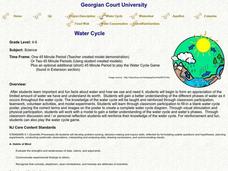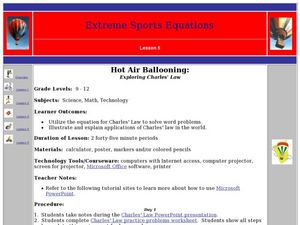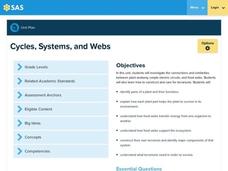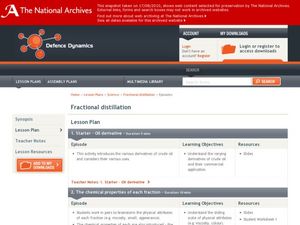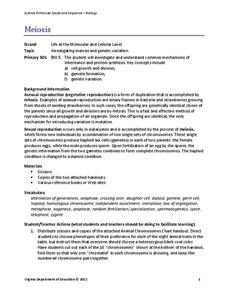Curated OER
Water Cycle
Students explore the water cycle. In this water cycle lesson, students examine water as a resource as they create a water cycle poster and create a water cycle model. Water cycle game instructions are included as well.
Curated OER
Barnegat Bay Watershed
Students design a model watershed. In this watershed lesson, students learn the needed parts of a watershed and how they work. Students evaluate how watersheds effect communities.
Curated OER
Aquifers and Groundwater
Young scholars understand the purpose of an aquifer. In this aquifer and groundwater lesson plan, students build a model aquifer find its relationship to water usage. Young scholars record observations as they build the layers of the...
Curated OER
How to Clean Up An Oil Spill
Students practice cleaning up an oil spill. In this good citizenship lesson, students experiment with different cleaning agents to see which ones clean oil off a soft toy. They compare this experiment with the volunteers helping with the...
Curated OER
Traveling the Planets!
Fourth graders research the planets and create brochures to share their information. In this planets lesson, 4th graders navigate the Internet to gather information for a brochure about an imaginary trip to their planet. Students...
Curated OER
Simulating the Greenhouse Effect in a Terrarium
Students identify what factors effect global warming and how the greenhouse effect occurs. In this environmental lesson students view videos then complete an experiment using a terrarium to observe greenhouse gas.
Curated OER
Killer Wrapper
Learners examine the importance of food safety and the impact it has on their lives. In this health lesson students complete an oral report on food poisoning and design a low cost "safe" packing material for bread.
Curated OER
Photosynthetic Pictures--Are Worth More Than a Thousand Words
Students observe and examine how carbon dioxide, water, and light produce glucose/starch through a process called photosynthesis.
Curated OER
NEWTON'S 3RD LAW
Young scholars examine the formal definition of Newton's 3rd law: "forces always originate in pairs, equal in magnitude and opposite in direction." --The informal, qualitative version: "Each action has an equal and opposite reaction."
Curated OER
Biological Relationships - Coral Reef Memory Game and Chain Game
Students familiarize themselves with the interconnectedness of species within an ecosystem, and to use this knowledge to evaluate how the removal or decimation of one species can have far reaching effects.
Curated OER
Pulleys and Gears
Students analyze an engineering problem. They contrast paper and pencil mastery of concepts with hands-on mastery. They present their design and rationale behind it, whether it works or not.
Curated OER
Introduction to Chemistry
In this introduction to chemistry worksheet, students answer 9 questions regarding the study of chemistry. The first part is matching, then they "think like a scientist" and then they problem solve.
Curated OER
The Mole
Students investigate moles and Avogadro's hypothesis. In this moles lesson plan, students complete a worksheet by finding the volume of 1 mole of each substance given its density and they find the number of molecules, the formula, the...
Curated OER
Toward a Sustainable Agriculture
Students analyze organic production systems. In this organic agriculture lesson, students examine key organic practices for both crop and livestock. This lesson includes 5 different activities, 4 critical thinking questions and...
Curated OER
Hot Air Ballooning: Exploring Charles' Law
Students solve word problems dealing with Charles' Law. In this Charles' Law instructional activity, students observe PowerPoint presentations concerning Charles' Law. They complete a WebQuest and describe the relationship between hot...
Curated OER
Building a Terrarium System
Learners create their own terrariums. In this ecological model lesson, students create terrariums using soil, seeds, pebbles, and two liter bottles. Learners compare the elements of a terrarium to a food web.
Curated OER
Intermediate Electromagnetism and Electromagnetic Induction
In this electrical circuit learning exercise, students answer a series of 24 open-ended questions about electromagnetism and electromagnetic induction. This learning exercise is printable and the answers are revealed online.
Curated OER
Elementary Amplifier Theory
In this amplifier learning exercise, students answer ten questions about amplifiers, their voltage gain, current gain and power gain. They analyze class-B transistor amplifiers and class-A transistor amplifiers.
Pennsylvania Department of Education
Cycles, Systems, and Webs
Fourth graders review the parts of the plant and their functions. In this plant lesson plan, 4th graders recognize that plants must transfer energy to make food. Students understand the interdependence of organisms in an ecosystem.
Curated OER
New Year's Resolution
Students brainstorm ways they can reduce their energy consumption and then create New Year's Resolutions with their families to put these conservation plans into action.
Curated OER
Fractional Distillation
Students brainstorm the different uses of petroleum distillates. In this chemistry instructional activity, students explain the process of fractional distillation. They analyze the impact of oil extraction to the environment.
Curated OER
Readings in Hudson River Natural History: Understanding Informational Text
After reading a series of informational articles regarding the Hudson River Estuary, the class will answer a series of comprehension questions. An answer key is provided but the articles and worksheets are not.
Curated OER
No Magic Borders: Haleakala Style
Students discuss borders and boundaries. They discuss pollution and the fact that boundaries cannot stop pollution and that pollution affects even protected wildlife and plants. They participate in an activity in which they must place...
Curated OER
Meiosis
Using yarn and chenille stems, lab groups collaborate to model mitosis and meiosis. Brief background information and a vaguely written procedure comprise this outline. More instruction needs to be provided to learners about cell division...


